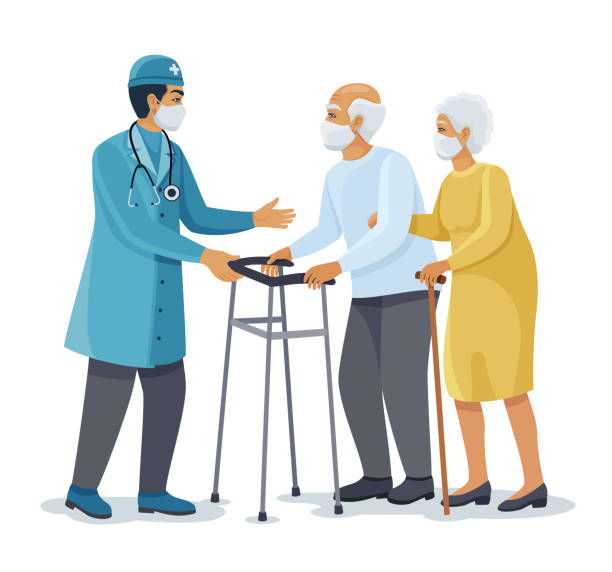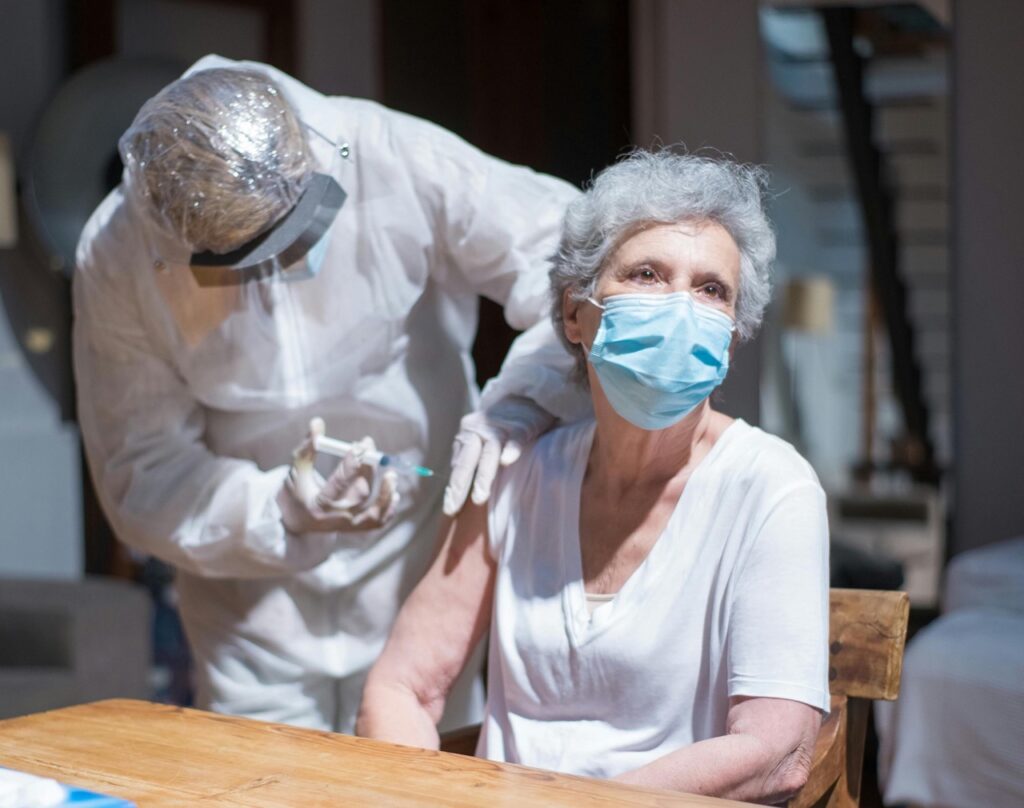As the golden years unfold, prioritizing preventive care becomes paramount in sustaining and enhancing the well-being of our seniors. In this article, we delve into the crucial realm of preventive care for seniors, exploring the proactive measures and personalized strategies that can contribute to a healthier and more vibrant aging process. From routine screenings to lifestyle modifications, we navigate the landscape of preventative healthcare, aiming to empower seniors and their caregivers with valuable insights and actionable information. Join us in discovering the keys to fostering longevity, independence, and an enriched quality of life through the lens of comprehensive and compassionate preventive care for seniors.

Understanding Preventive Care
As we age, it becomes increasingly important to prioritize our health and well-being. One of the most effective ways to do this is through preventive care. Preventive care involves taking steps to prevent illness or detect health problems early, before they become more serious. In this section, we will discuss the role of screening and vaccinations in preventive care which is an essential part of health management, especially for seniors. As we age, our bodies become more susceptible to illnesses and chronic conditions. Preventive care helps detect any potential health issues early on, allowing for timely treatment and management.
The Role of Screening in Preventive Care
Screening is a vital component of preventative care. It entails screening for diseases or disorders before symptoms occur. The United States Preventive Services Task Force (USPSTF) recommends screening for cancer, high blood pressure, and osteoporosis.
Cancer screening is very crucial for elders. The American Cancer Society recommends that women aged 50 to 74 have a mammogram every two years, and men and women aged 50 to 75 be checked for colorectal cancer. Other cancer screenings, such as pap exams and colonoscopies, may be recommended based on an individual’s risk profile.
In addition to cancer screening, elders should be checked for other illnesses. This could involve cholesterol, diabetes, and abdominal aortic aneurysm screening.
High blood pressure screening is also necessary since high blood pressure can cause major health problems such as heart disease and stroke.
Vaccination and Immunization
Vaccinations are an important part of preventive care for seniors. Vaccines help protect against a wide range of diseases, including the flu and pneumonia. The Centers for Disease Control and Prevention (CDC) recommend that seniors have an annual flu vaccination as well as a pneumonia vaccine.
In addition to these vaccines, seniors may require additional vaccinations depending on their risk factors. Seniors, for example, may need to be vaccinated against diseases like yellow fever or typhoid before traveling to certain parts of the world.
To summarize, preventive care is critical for maintaining good health of seniors. Screening and immunizations are two important components of preventive care that can help detect health issues early and prevent sickness. Prioritizing our health and well-being allows us to enjoy a higher quality of life for many years to come.

Lifestyle Factors and Preventive Health
As we get older, it becomes increasingly necessary to take care of ourselves and our health. While genetics have a role, lifestyle choices can have a big impact on our overall health. In this section of the article, we’ll go over some of the main lifestyle elements that can help us stay healthy and avoid sickness.
Nutrition and Weight Management
Maintaining a balanced diet is critical for general health and well being. As we become older, it becomes increasingly crucial to ensure that we are obtaining enough nutrients. A well-balanced diet rich in fruits, vegetables, whole grains, and lean protein can help us maintain a healthy weight, lower the risk of chronic disease, and improve cognitive function.
Obesity and overweight are important health issues for both men and women. According to the CDC, more than 42% of persons over 60 are obese. Being overweight or obese increases the risk of heart disease, stroke, type 2 diabetes, and some types of cancer. Eating a nutritious diet and exercising regularly can help you manage your weight and lower your risk of developing these conditions.
Exercise and Physical Activity
Regular exercise and physical activity are vital for maintaining good health and avoiding illness. Exercise can assist to maintain muscle mass, enhance balance and coordination, and lower the chance of falling. It can also help lower the risk of chronic illnesses like heart disease, stroke, and type 2 diabetes.
Older adults should engage in at least 150 minutes of moderate-intensity aerobic activity each week, as well as muscle-strengthening activities on two or more days. Walking, swimming, and cycling are all excellent low-impact exercises that can be readily included into your everyday routine.
Substance Use and Mental Health
Smoking and alcohol abuse can have substantial health repercussions, especially in older persons. Smoking is a significant risk factor for heart disease, stroke, and lung cancer. Quitting smoking can lower your risk of developing certain diseases while also improving your general health.
Alcohol abuse can also have major health repercussions, such as liver disease, high blood pressure, and an increased chance of developing some types of cancer. Older persons should limit their alcohol consumption to one drink per day for women and two drinks per day for males.
Depression and other mental health concerns can have a serious influence on general health and well-being. If you are experiencing symptoms of depression or other mental health difficulties, you should get professional help. Regular physical activity, engaging with friends and family, and practicing relaxation techniques like meditation or deep breathing can all improve mental and cognitive wellness.
Finally, keeping a healthy lifestyle is critical for illness prevention and long-term health. We may improve our general health and well-being by eating a good diet, exercising regularly, and refraining from substance abuse.

Managing Chronic Conditions and Comorbidities
As we age, we become increasingly vulnerable to chronic diseases and comorbidities. These illnesses can significantly affect our quality of life and well-being. However, with good management, we may mitigate the effects of these illnesses while maintaining our health and independence. In this section, we will look at some of the most prevalent chronic diseases and comorbidities that seniors face, as well as how to treat them effectively.
Heart and Cardiovascular Health
Heart disease is the major cause of death among seniors. As a result, it is critical to take precautions to preserve a healthy heart and lower the risk of cardiovascular disease. High blood pressure, high cholesterol, and obesity are all risk factors for developing heart disease. Managing these risk factors can help to minimize the risk of heart disease.
To maintain heart health, we can make lifestyle changes such as eating a balanced diet, exercising regularly, and quitting smoking. In addition, we can periodically test our blood pressure and cholesterol levels and take medicine as directed by our physician.
Cancer Awareness and Prevention
Cancer is another prevalent chronic illness that affects the elderly. Breast, prostate, colorectal, and lung cancer are among the most frequent cancers in seniors. However, early detection and prevention can greatly increase the likelihood of effective therapy.
Regular cancer screenings are necessary for early identification and treatment. Women should have frequent mammograms and cervical cancer screenings, while males should have regular prostate cancer exams. Additionally, seniors should be aware of the signs and symptoms of cancer and report any changes to their healthcare physician as soon as possible.
Bone Health and Fall Prevention
Osteoporosis is a prevalent chronic disorder that affects the elderly, resulting in bone loss and density. This may increase the likelihood of falls and fractures. As a result, it is critical to take precautions to maintain bone health and avoid falls.
We can preserve bone health by eating a calcium and vitamin D-rich diet, exercising regularly, and avoiding smoking and excessive alcohol intake. In addition, we can take medication given by our healthcare practitioner to prevent bone loss.
To help avoid falls, we may make our houses safer by removing tripping hazards, installing grab bars and handrails, and boosting lighting. We can also do balancing exercises and wear appropriate footwear to lessen the danger of falling.
In conclusion, managing chronic illnesses and comorbidities is critical to maintaining our health and independence as we age. By changing our lifestyle, monitoring our health, and seeking regular medical care, we can lessen the burden of these disorders and live a better life.

Accessing and Navigating Preventive Care
As we become older, accessing and navigating preventive services becomes more crucial for our health and well-being. Here are a few pointers to assist you navigate the complex world of preventative care.
Medicare and Insurance Coverage
One of the first things to consider when seeking preventive care is your insurance coverage. Medicare covers several preventative procedures, including screenings, testing, and an annual wellness exam. Some of these services are free, but others may have a charge or deductible. It is critical to understand what is covered by your plan and to take advantage of its benefits.
If you have additional insurance coverage, such as via your job or private insurance, you should check to see what preventative procedures are covered by your plan. Some plans may offer extra services or have varying copays and deductibles.
Finding the Right Healthcare Provider
Finding the correct health care provider is another critical component in gaining access to preventive services. Your primary care physician is frequently the best place to begin, as they can assist coordinate your care and recommend appropriate preventive services based on your age, medical history, and family history.
If you don’t have a primary care doctor, look for one in your area. Many insurance plans feature provider directories that can be searched online. You can also get referrals from friends and relatives or read internet reviews to identify a service who suits your needs.
It is critical to arrive at a health care provider prepared when seeking preventive services. Bring a list of the drugs you are currently taking, as well as any questions or concerns you may have. Be open and honest about your health behaviors and lifestyle so that your provider can offer appropriate preventative care recommendations.
Conclusion
In summary, using preventive care on a regular basis has a big effect on health results and life expectancy for seniors like you. By using these services, we give ourselves the tools to find and deal with possible health problems as soon as they appear. This lowers the risk of developing more serious and complicated conditions. In turn, this leads to a better quality of life, which in turn makes people live longer and lowers the death rate among seniors.
To be in the best health possible in our older years, we need to do more than just use preventive services. We need to make them an important part of our daily health care. We can confidently handle this complicated landscape by making well-informed decisions, working together with our healthcare providers, and committing to our ongoing wellness. This will ensure that our later years are filled with vitality, resilience, and a thriving sense of well-being.


